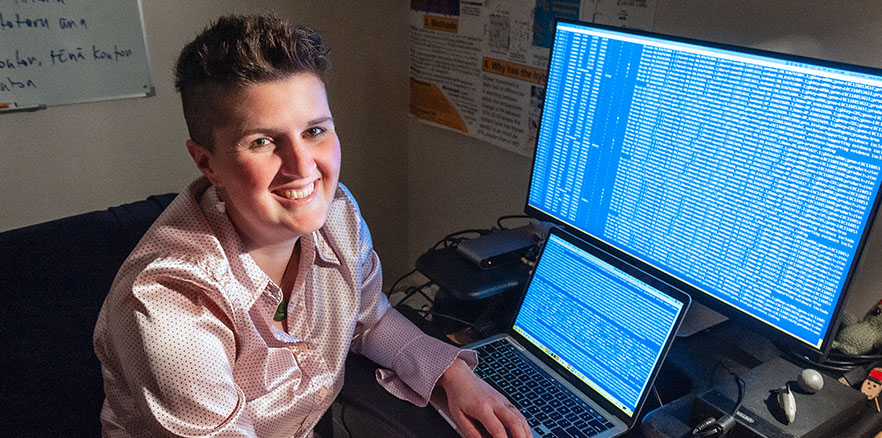
Dr Alana Alexander
Having grown up as a self-confessed nerd with her nose in a rock pool, Rutherford Discovery Fellowship recipient Dr Alana Alexander (Ngāpuhi: Te Hikutu, Pākehā) always imagined herself on-board a boat studying dolphins and whales.
That was until she found just how seasick she could get.
Entering a research career working in genetics, she soon saw what an amazing window it could be into where tohorā (Southern Right Whales) were moving and what their lives were like.
“I'm hoping that these 'science pūrākau' might be a powerful way to inspire and encourage some of the next generation to pick up the tools of genomics to learn about and care for taonga species.”
“It was a way to study whales and dolphins without the sea sickness.”
Alexander is currently on a prestigious five-year Rutherford Discovery Fellowship from the Royal Society Te Apārangi, investigating past, present and future conservation impacts to whales and dolphins using genomics.
Although fishery bycatch has heavily impacted Hector's and Māui dolphins, toxoplasmosis is an emerging threat, especially for Māui dolphins, which now number about 54 adults. Normally carried by domestic cats, when they defecate near waterways, it is thought the parasite's spores can work their way down to the ocean.
“We're seeing an increasing number of dolphins dying with signs of toxoplasmosis, so we are looking to see if there is any difference in the dolphin's genomics and its microbiome to see if there is something that makes it more susceptible.”
Alexander is also applying her genetic knowledge to pest control. She is working to identify the genes involved in reproduction or survival in pests such as possums, which could then be used to try to manage them.
“I'm hoping that these 'science pūrākau' might be a powerful way to inspire and encourage some of the next generation to pick up the tools of genomics to learn about and care for taonga species.”
Significantly, she is looking to convert this scientific knowledge into a form that's digestible for Māori communities, including making resources in te reo Māori.
“It means people can then use their own judgements about the tikanga and the appropriateness of those technologies, after they know how the science works.”
This is an area that also ties back into her research on whales and dolphins, where she will be seeking to use pūrākau (traditional narratives) as templates to translate what she describes as the “nerd-speak of genomics” into insights for hapori Māori (Māori communities).
Recent awards
- Rutherford Discovery Fellowship (2022)
- Predator Free New Zealand Capability Development Funding (2021)
- Kaupapa Māori Award, Otago School of Biomedical Sciences (2020)
- OUSA New Supervisor of the Year and Division of Health Sciences Supervisor of the Year (2020)
Funding
- Royal Society Te Apārangi
- Rutherford Foundation
- Predator Free 2050
- Genomics Aotearoa
- Coastal People Southern Skies
More stories about early career researchers
This story is part of the research publication 'He Kitenga 2022: Talented Futures', which presents the different pathways into research that early career researchers follow.